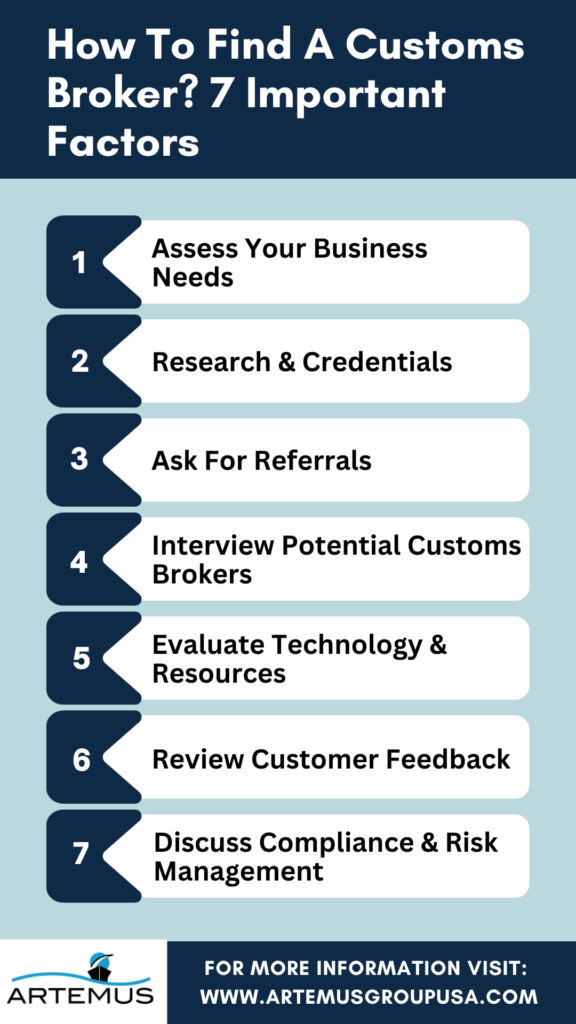
What Is Inbound Logistics & Outbound Logistics? A 2025 Guide
In the dynamic world of supply chain management, understanding the nuances of inbound and outbound logistics is crucial for operational

In the intricate world of international trade, one essential ally stands out—a customs broker. These professionals are your navigators through the labyrinth of customs regulations, trade laws, and import-export complexities. Therefore in this blog, we’ll answer the critical question – How To Find A Customs Broker?
Whether you’re an experienced global trader or just stepping into the realm of international commerce, finding the right customs broker is a critical decision. They ensure your goods move smoothly across borders while staying in compliance with the ever-evolving trade landscape. But how do you go about finding the perfect customs broker to meet your specific needs?
Moreover, Artemus Transportation Solutions offers cutting-edge customs broker software designed to streamline compliance in the world of international trade. So, let’s embark on a journey to find your ideal customs broker and discover how technology can revolutionize your global trade experience.
Table Of Contents

A customs broker is your ally in ensuring that your imports and exports flow smoothly through customs, meeting all legal requirements while saving you time and resources. In this blog post, we’ll guide you through the process of finding the right customs broker for your business, so you can focus on expanding your global reach with confidence.
The first step in finding the perfect customs broker is to assess your business needs. Different businesses have different requirements when it comes to international trade. Are you a small e-commerce business with occasional imports, or a large manufacturer with regular shipments? Knowing your specific needs will help you narrow down your choices and find a customs broker who can cater to them effectively.
Once you have a clear understanding of your requirements, start your search for customs brokers. Look for brokers who have a strong track record of success in your industry. It’s essential to choose a broker with a proven history of compliance and expertise in your type of product. Check if they are licensed by the relevant authorities and accredited by customs associations. Credentials and experience are vital indicators of a trustworthy customs broker.
Don’t hesitate to ask for recommendations from peers in your industry or fellow business owners. Their first-hand experiences with customs brokers can provide valuable insights. They can steer you toward brokers who have demonstrated exceptional service and reliability. Personal referrals can be one of the most reliable ways to find a customs broker you can trust.
Once you have a shortlist of potential customs brokers, take the time to interview them. Discuss your specific needs and expectations. Ask about their fees and any supplementary costs. It’s crucial to have a clear understanding of the costs involved in their services. Additionally, ask about their communication practices, as effective communication is key to a successful partnership.
In today’s digital age, the customs process can be greatly expedited with the use of technology. Inquire about the customs broker’s IT capabilities and whether they offer an online portal for tracking and managing shipments. A customs broker with a robust technology infrastructure can make your operations more efficient and transparent.
Check online reviews and testimonials from other businesses that have worked with the customs broker. These reviews can provide valuable insights into the broker’s reputation, customer service, and reliability. Pay attention to any recurring positive or negative feedback, as this can be indicative of their overall performance.
Compliance is a critical aspect of international trade, and a customs broker’s role is to ensure that your business adheres to all regulations and laws. Inquire about their compliance procedures and how they handle potential risks. A reliable customs broker will have a comprehensive risk management strategy in place to minimize the chances of costly delays or fines.
Related: What Does A Customs Broker Do? 10 Key Responsibilities
International trade offers lucrative opportunities but also comes with complexities and regulations. Customs brokers simplify import and export processes, making it easier, especially for newcomers. Now, let’s explore the advantages of enlisting the services of a customs broker.
1. Expertise In Customs Regulations: Customs brokers are well-versed in the ever-evolving world of customs regulations and trade compliance. They can help you avoid costly errors and ensure that your shipments meet all legal requirements.
2. Time And Resource Savings: Handling customs documentation and procedures can be time-consuming. By delegating these tasks to a customs broker, you free up valuable time and resources to focus on your core business activities.
3. Customs Clearance Efficiency: Customs brokers have the expertise to expedite the customs clearance process. They know the ins and outs of paperwork, reducing the chances of delays and speeding up the release of your goods.
4. Cost Savings: Customs brokers can help you identify cost-saving opportunities. They can advise on the most efficient shipping methods, duty rates, and tax liabilities, ultimately reducing your expenses.
5. Compliance Assurance: Ensuring compliance with customs and trade regulations is critical to avoid fines and penalties. A customs broker ensures that your shipments adhere to all legal requirements.
6. Industry Knowledge: Customs brokers often specialize in specific industries, such as healthcare, automotive, or textiles. Their industry-specific knowledge allows for tailored solutions that meet your unique needs.
7. Risk Mitigation: International trade carries inherent risks. Customs brokers help mitigate these risks by offering guidance on insurance, managing customs audits, and ensuring your operations run smoothly.
8. Access To Networks: Customs brokers have extensive networks and connections within the industry. They can leverage these connections to resolve issues and navigate complex customs situations.
9. Simplified Documentation; Customs documentation can be overwhelming, but customs brokers are experts in completing and organizing the required paperwork accurately, reducing the risk of errors.
10. Peace Of Mind: Hiring a customs broker provides peace of mind. You can trust that a professional is managing the customs process, allowing you to focus on the growth and success of your business.
Related: Customs Broker VS Freight Forwarder: 5 Key Differences

To ensure you make an informed choice, here are some essential questions to ask potential customs brokers during the selection process:
This is a fundamental question. Verify that the customs broker possesses the requisite licenses and certifications for lawful operation.
Ask about their industry experience and how many years they have worked in the field. More experience often means a better understanding of the complexities of customs and trade regulations.
Ask for references from past clients. Speaking with businesses they’ve worked with can offer insights into their performance and reliability.
Determine if the customs broker has experience in your specific industry. Industry-specific knowledge can be a valuable asset.
Customs regulations can change frequently. A good customs broker should have a system in place to stay updated on the latest changes and how they might impact your operations.
Understand their fee structure and any additional costs. Having transparent pricing is crucial for effective budgeting.
Inquire about their approach to managing customs audits. You want a customs broker who can assist in these situations.
In today’s digital age, technology plays a significant role in customs brokerage. Inquire about the software and tools they utilize in their operations.
Understanding their approach to ensuring compliance with customs and trade regulations is crucial for avoiding fines and penalties.
Effective communication is key. Find out how they keep clients informed and address inquiries and concerns.
Ask the customs broker to walk you through the entire process, from handling documentation to customs clearance. This will provide you with a clear comprehension of what you can anticipate.
Delve into their problem-solving abilities. How do they manage unforeseen challenges or unexpected delays?
Related: Can A Customs Broker Be The Importer Of Record Legally?
Here are five essential tips to help you negotiate with customs brokers successfully:
Before entering negotiations, define your expectations and specific needs clearly. What services do you require, and what results are you aiming for? Being precise from the start sets the stage for a productive negotiation.
Customs brokers have varying fee structures, which can include fixed fees, transaction-based fees, or a combination of both. Ensure you fully understand their pricing model and any additional costs. Negotiate for a transparent fee structure that aligns with your budget.
Effective communication is vital in international trade. Determine the frequency and methods of communication with your customs broker. A clear and responsive communication channel is essential to address issues, updates, and concerns promptly.
Establish roles and responsibilities clearly. Outline what you expect from the customs broker and what tasks will be handled by your team. A well-defined division of labor prevents misunderstandings and ensures a smooth workflow.
Carefully review the service agreement or contract provided by the customs broker. Pay attention to terms and conditions, including service levels, dispute resolution procedures, and termination clauses. Be prepared to negotiate these terms to align them with your requirements.
Before finalizing your choice of a customs broker, it’s beneficial to seek references from their current or past clients. Contacting these references can provide insights into their negotiation practices and reliability. Additionally, consider obtaining offers from multiple customs brokers to compare services and pricing.
Related: Customs Broker Exam (CBLE): A Comprehensive 2024 Overview
A customs broker contract is a vital agreement that sets the terms for the relationship between an importer/exporter and their chosen customs broker. It outlines roles, responsibilities, and expectations. Key components include:
Begin the contract by clearly identifying the parties involved, including the importer/exporter and the customs broker. Provide full contact details for easy reference.
Detail the scope of the customs broker’s services. Specify the specific tasks and responsibilities the customs broker will handle, such as customs clearance, documentation, compliance, and communication with relevant authorities.
Define the contract’s start date and duration. Specify whether it is a one-time engagement for a specific shipment or an ongoing, long-term arrangement.
Clearly outline the customs broker’s fee structure, including any fixed fees, transaction-based fees, or other charges. Include terms for billing, payment deadlines, and any applicable late payment penalties.
Specify the methods and frequency of communication between both parties. Effective communication is essential for addressing issues, updates, and concerns in a timely manner.
Address how data and documents will be managed and secured. Ensure that there are safeguards in place to protect sensitive information and maintain confidentiality.
Include provisions that detail the customs broker’s commitment to ensuring compliance with all relevant customs regulations and laws.
Outline the process for resolving disputes or disagreements that may arise during the partnership. This section can include mediation, arbitration, or any other agreed-upon resolution method.
Detail the circumstances in which either party can end the contract. Include notice periods and any related obligations upon termination.
Address the extent of liability and indemnification for each party in the event of losses, damages, or legal actions related to the customs broker’s services.
Related: What Are The Likely Customs Broker Exam Pass Rate For 2024?
Artemus is your gateway to a streamlined and efficient customs brokerage experience. Our high-end customs broker software is meticulously designed to ensure seamless compliance with ever-evolving regulations. With Artemus, you can confidently navigate the complex world of international trade, leveraging cutting-edge technology to stay up-to-date with the latest customs requirements.
The software’s user-friendly interface simplifies the often intricate process, empowering customs brokers and businesses alike to save time and resources while maintaining the highest standards of compliance. Artemus adapts to the changing landscape of international trade, ensuring that your business remains in full compliance while minimizing the risk of costly errors.
Related: Custom Broker Fees Explained: The Figures You Need To Know
If you’re involved in international trade, a customs broker can simplify compliance, expedite customs processes, and help avoid costly mistakes.
Customs clearance charges are fees incurred for processing and managing the import or export of goods through customs.
A customs broker is also known as a customs agent or import/export broker.

In conclusion, finding the right customs broker is an essential step in ensuring a smooth and compliant international trade experience. By following the tips outlined in this guide, you can simplify your search and narrow down the options to identify the customs broker that best suits your business needs. Remember to consider their expertise, track record, and responsiveness to your specific requirements.
Whether you’re an experienced importer or a newcomer to global trade, a dependable customs broker can serve as a valuable ally in maneuvering the intricacies of customs regulations, ultimately saving you valuable time and resources. So, take your time, do your research, and make an informed decision that sets you up for success in your international business endeavors.

In the dynamic world of supply chain management, understanding the nuances of inbound and outbound logistics is crucial for operational

In today’s interconnected world, businesses rely heavily on global trade to expand their markets, access new resources, and drive growth.

Importing goods for resale in the USA presents a lucrative business opportunity, but navigating the complexities of U.S. customs regulations,
Get In Touch
Artemus’ Software Solutions for ISF, AMS, Japan AFR, eManifest Canada, & Panama B2B filings.